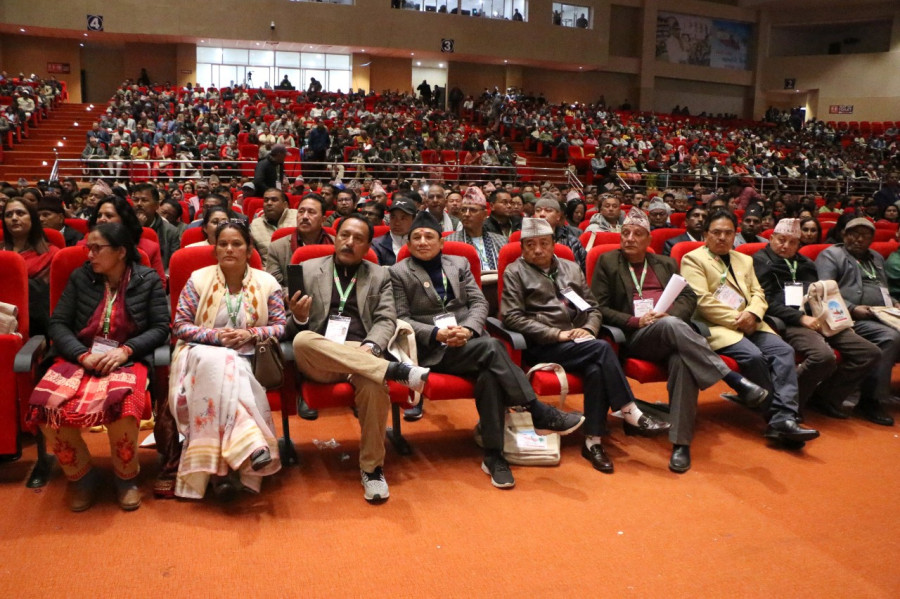Politics
After Mahasamiti, Congress still unclear on election alliances
Gagan Thapa’s proposal opposing poll alliances endorsed but central committee tasked with giving it the final shape.
Post Report
The high-profile Mahasamiti meeting of the Nepali Congress concluded on Thursday without resolving the dispute over whether the party should opt for political alliances in the next elections. General Secretary Gagan Thapa had proposed that the party should refrain from forging alliances in the elections, which are around four years away.
The meeting concluded by issuing an 11-point declaration.
According to a statement issued at the end of the Mahasamiti meeting, all three political documents—presented by party vice-president Purna Bahadur Khadka and general secretaries duo Thapa and Bishwa Prakash Sharma—were endorsed.
The grand gathering endorsed the reports presented by Khadka, Thapa and Sharma, but with the condition that the Central Working Committee would give a final shape to the documents by making changes.
“Very important suggestions have been received during the closed-door session,” said the statement. “The Central Working Committee of the party will later endorse these reports with changes based on the suggestions and feedback received at the Mahasamiti.”
Khadka, Thapa and Sharma had presented proposals on the party’s policy, organisation, and contemporary politics, respectively.
“By giving continuity to the existing coalition in which the Congress has a significant presence, the party, through the government, should strive to control corruption, anomalies and poor governance,” the statement said.
But Thapa supporters were not happy with the conditional endorsement of his political document.
“Majority of the Mahasamiti members were opposed to the idea of electoral alliances, but the establishment faction tried to distort the facts and muzzle those voices,” said Ajay Babu Shiwakoti, a Thapa confidant.
“We felt that the party establishment also capitalised on Tuesday’s meeting between Prime Minister Pushpa Kamal Dahal and CPN-UML chief KP Oli to stress the importance of the existing Congress-Maoist partnership,” said Shiwakoti.
In the political quarters, the Tuesday evening meeting between Prime Minister Dahal and Oli was interpreted as a pressure tactic by Dahal that he has the UML ready as a backup in the event of the Congress pulling out of the coalition.
“Within and outside the party, a kind of psychological pressure was building against Thapa,” said Shiwakoti. “But despite all such conspiracies, the meeting eventually decided to own up the agenda of contesting the elections independently.”
The Congress fought the November 2022 elections in an alliance with the parties, mainly the CPN (Maoist Centre), that had come together to counter Oli’s policies while he led the government until 2021. The Congress party was divided even then with some leaders and cadres voicing strong words of discontent at having to vote for the candidates of other parties. The Thapa-Shekhar Koirala faction has been raising its view that such pre-poll alliances are counter-productive for the party as they dilute the ideology that attracts supporters.
At the conclusion of the Mahasamiti meeting, Deuba said that it was the duty of the Nepali Congress to fully cooperate with the government as the largest party in the coalition. “We have received some important suggestions and feedback, which will be incorporated into the reports before the Central Working Committee endorses them.”
Thapa, in his concluding remarks, said that the general public wants good governance and effective service delivery. “Let’s focus on service delivery and good governance instead of worrying about the next elections,” said Thapa. He also demanded that the property of individuals who held public offices after 1990 be investigated.
The other general secretary, Sharma, said that from the next elections, the Nepali Congress would pick its candidates through primaries, as in the US.
Former general secretary Shashanka Koirala said if the Congress party remains united, it does not need to partner with other parties for elections.
“Let’s further deepen relations among our own leaders and party members to win elections.”
He also called for the restoration of the Hindu state. “It was wrong to declare Nepal a secular state in the first place,” said Koirala, who is one of the signatories to a petition launched by a Congress faction led by lawmaker Shankar Bhandari calling for the restoration of the Hindu state. Over 1,000 Mahasamiti members have already signed the petition. Bhandari has presented the petition to party chief Deuba for consideration. But Deuba has already dismissed the idea saying that the current political situation does not allow such a change.
Shekhar Koirala, who is also opposed to electoral alliances especially among parties with clashing ideologies, said the Congress should take the lead in order to change the electoral system.
Koirala’s comment comes amid complaints by leaders of various parties about the costly nature of the current elections, which they claim also makes it difficult for any party to win a majority due to its mixed nature—direct and proportional representation.
Thursday’s closed-door session also saw some heated exchanges among leaders and cadres over alleged attempts by “some members to distort the findings of group discussions.”
The party had formed four groups to study the political documents presented by the two general secretaries—Thapa and Sharma, and Vice-president Khadka. The committees had presented their findings on Thursday, the last day of the Mahasamiti.
The party establishment led by Deuba says electoral alliances should be viewed as a strategy, but the rival faction led by Thapa asserts that the party should make it a policy not to forge electoral alliances.
Most of the senior party leaders who spoke in the concluding session expressed their views that the Congress had emerged stronger after the Mahasamiti meeting.
“The meeting has sent a message of broader unity inside the Nepali Congress,” said Krishna Prasad Sitaula, an upper house member and former secretary general of the party.




 13.12°C Kathmandu
13.12°C Kathmandu













